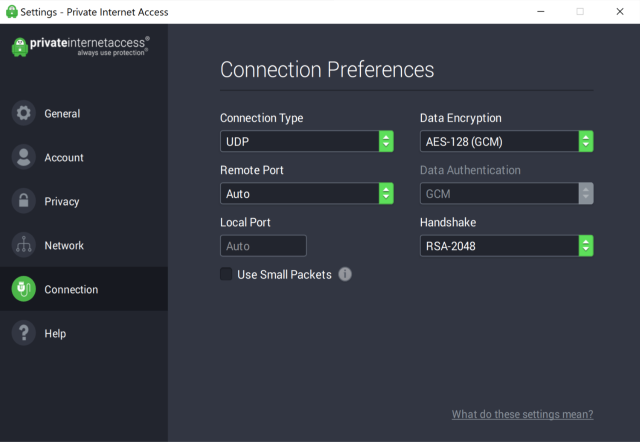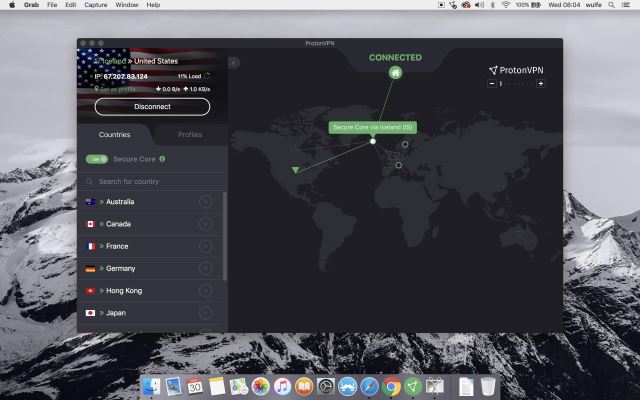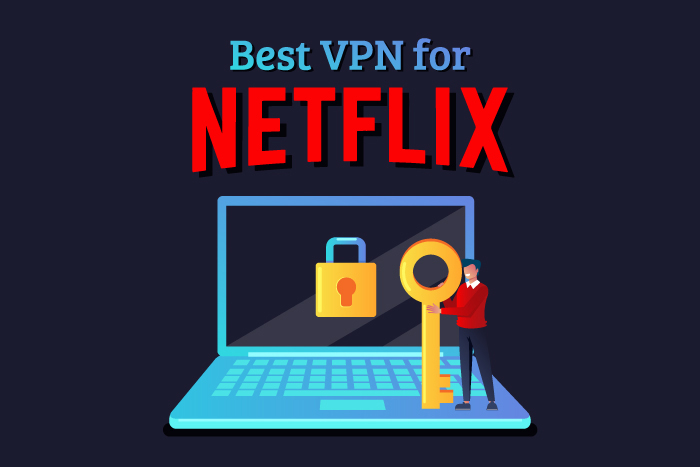If you want to watch Netflix while you’re abroad or you want to maintain information security regarding your Netflix consumption, you’re going to need to use a VPN which can handle your streaming video traffic.
While this may seem like a simple requirement at first, in fact finding a VPN that is Netflix-compatible is far more important than it might seem. If you settle for a subpar VPN, there’s a good chance Netflix has already blocked it.
On the other hand, if you find an unblocked VPN that doesn’t solve any of the problems that you have with internet access and Netflix in general, you’ll be stuck with a new set of problems which you may not have had before.
In this article, we’ll investigate which VPNs are the best for watching Netflix, explain why VPNs and Netflix is a controversial issue in the first place, and help you to identify the factors that you should look for when you shop around for a VPN.
Why Can’t I Watch Netflix On Any VPN?
If you’re reading this article, you’re probably already aware that Netflix has a contentious relationship with its users on account of its VPN policy.
The short answer to why you can’t watch Netflix on any VPN is that Netflix does its best to block as many VPN users as possible. Netflix isn’t forthcoming about why they do this, but there are a few clues in their terms of service.
It is reasonable to assume that Netflix blocks VPNs because:
- VPNs protect user privacy
- VPNs may be less efficient in their bandwidth use
- VPNs enable multiple users to utilize the same Netflix account
- VPNs allow users to skirt geographical restrictions on content
Let’s break each of these reasons down individually.
Privacy Protection
You already know that VPNs are powerful tools in protecting your personal privacy. But why might Netflix want to undermine that privacy by blocking your VPN?
In a nutshell, Netflix monetizes its users in a handful of different dimensions. The first dimension is the monthly subscription fee that you pay to Netflix to access the service.
The second dimension is the opportunities that Netflix has to upsell you on new channels and extensions to the content of channels you already subscribe to. This second dimension is why Netflix doesn’t appreciate it when users utilize VPNs.
When you use Netflix, your clicks, tastes, and time spent lingering on each page of the service’s website are tracked and cataloged for up-selling and cross-selling at a later date using big data methods.
With a VPN, your information is still logged because you are logged into Netflix. But, VPNs may distort the way that Netflix can gather user information thanks to the way that they are capable of obfuscating your digital identity.
This means that when you use a VPN, Netflix can’t get as much money out of you as a customer as they aspire to. On a small scale, this fact wouldn’t impact their bottom line very much. But, with mass VPN usage, it saps their ability to understand their customer base.
So, Netflix isn’t opposed to your ability to have privacy per se. It’s that when you exercise your right to privacy by using a VPN, it undermines their bottom line by sending them false information.
Bandwidth Consumption
It should be the case that using a VPN doesn’t change the amount of bandwidth that Netflix utilizes.
But, because internet traffic is routed along different paths if you use a VPN — because the traffic must be passed through the VPN’s servers before it reaches your computer — VPNs may cause slowdowns which are hard for service providers to expect.
Netflix is a major company whose bandwidth expenditures are large. In fact, Netflix partners with ISPs at every level of the network stack to ensure that its traffic is loaded evenly and distributed effectively to its customers.
In other words, Netflix is a major consumer of bandwidth and internet traffic, which means that tiny optimizations that it can make translate directly into the company saving money.
VPNs, however, throw a wrench into Netflix’ plans because they prevent ISPs from understanding the content of the traffic. Netflix traffic that is sent through a VPN can be routed into places that it wouldn’t normally go, which makes load-balancing very complicated.
By blocking VPNs, Netflix eases its relationship with critical suppliers of bandwidth, which helps their bottom line.
Multi-Boxing
VPNs enable users to plausibly deny that they are exceeding the number of different people who can use a single Netflix account. Under the Netflix terms of service, with some plans it is acceptable for multiple people to share the same account.
For instance, members of the same family can use the same Netflix account. Netflix enables this behavior by giving people separate logins. But, with a VPN, it quickly becomes impossible to enforce that each subscription corresponds to a finite set of real people using the service.
Netflix has a few tools to determine who is using a subscription. The first tool is the account login information. But, as we mentioned, multiple people can share a login which uses the same subscription.
So, Netflix also checks the IP address and other relevant browser information for each of the logins to a single account. Under normal conditions, three people would have three different IP addresses, so Netflix could tell how many people are using the account.
But, with a VPN, this entire paradigm goes out the window. One IP address — specifically, the IP address of the VPN’s server — could easily correspond to hundreds of different people.
If multiple people are using the same account, they can easily mask it by having everyone log into the same VPN server. This means that Netflix is forced to leave money on the table because these people would otherwise need to purchase new subscriptions of the service.
In theory, it is possible for Netflix to use techniques like browser fingerprinting or tracking cookies to confirm whether accounts are being accessed by the correct number of people.
But, these methods are more expensive than the alternative: banning VPNs. So, banning VPNs makes sense for Netflix from a business point of view.
Geographical Restriction Liberation
Many shows are released at different times in different geographical regions. This might lead to situations where the US can see a show two months before the UK. Using a VPN lets people in either country get around this restriction and see the show on its earliest release date.
While this is a compelling reason for Netflix to ban VPNs alone, it isn’t the only reason. Many shows are licensed for use in specific geographical locations under different terms than in other locations.
For example, a show might be licensed for public broadcast in one place, but only licensed for paid syndication broadcast in another place.
So, to avoid being subjected to a bevy of lawsuits regarding violating the licensing terms, Netflix complies with licensing by restricting the content on their platform. Of course, when users use a VPN to get around the restriction, they can subsequently cause Netflix to be in violation anyway.
This means that Netflix has a strong incentive to ban VPNs because when users have VPNs it may in theory leave the company open to license violation lawsuits which will be pressed by powerful media organizations.
Who Needs A VPN For Netflix The Most?
Now that you understand the incentives that Netflix has for banning VPNs, it’s time to assess whether you genuinely need a VPN for watching Netflix.
If you’re in one of the following groups of people, you should rest assured that getting a VPN which is Netflix-capable is a priority.
Frequent Travelers
If you frequently travel to locations where your favorite shows are restricted, you’ll need a VPN to keep your binge schedule unperturbed by your voyages.
Frequent travelers get the short end of the stick as far as Netflix use goes. Technically you’re not in violation of any licensing when you watch Netflix from abroad, but Netflix still prohibits you from accessing the content that you deserve.
Using a VPN helps you to get around Netflix trying to block you from doing something that you’re legally allowed to do.
Privacy and Security-Conscious People
If you suspect someone is spying on your internet traffic in an attempt to learn your entertainment preferences, you’ll need a VPN when you use Netflix. Especially if you resent Netflix’ attempts to learn about the way that you use their service, you’ll need a VPN.
Likewise, if you want to prevent anyone from identifying the type of traffic that you are passing through the network while watching Netflix, you’ll need a VPN. This is especially important for people who are uploading and downloading videos from multiple sources at the same time.
Finally, if you want your Netflix credentials to be as secure as possible because you suspect that someone may be trying to subject you to a man-in-the-middle attack, your VPN will protect you from anyone who is snooping.
But, for most people, this isn’t a concern because their Netflix traffic isn’t something that a malicious third party would be interested in having access to via such an attack.
Netflix TOS Violation Conspirators
If you intend to share your Netflix account with a group of people beyond the size that Netflix normally allows and you want to avoid getting caught, you’ll need a VPN.
But, in general, you shouldn’t conspire to break Netflix TOS. If you use their service, you should be willing to pay for a subscription. This remains true whether or not you share your login with the sanctioned number of people or whether you break the rules.
Remember, a VPN can’t completely prevent Netflix from catching you for breaking their TOS by sharing your account with too many people. It can delay the inevitable, however.
When you get caught, you will probably lose your Netflix subscription, so plan accordingly. A VPN will be helpful, but it won’t be the only thing you need to access Netflix without encountering problems in the long run.
What Should I Look For In A VPN For Netflix?
You’ll need to look for the following characteristics when you’re shopping around for a VPN:
- The ability to access and watch Netflix
- Privacy-enabling features
- Advertisement-blocking features
- VPN server quantity and distribution
- Speed
- Logging
- Number of connections
- Customer support
We’ve covered these topics a bit earlier, but there are a few which are worth singling out for more discussion.
You’ll need a high-speed VPN. Without a high-speed VPN, you’ll be subject to buffering times whenever you load your favorite shows. Many VPNs are fine for email and web surfing, but falter when they need to handle streaming video.
Speed isn’t the only consideration, however. You don’t want your VPN to be introducing privacy liabilities that you are trying to solve by using a VPN in the first place. Most VPNs are forthcoming about the fact that they do not retain logs of their users’ activity.
But, some unsavory VPNs — often, VPNs which are free to the public — can be worse for your privacy than not using a VPN at all.
While the difference is negligible with regard to the ease of watching Netflix, you don’t want to let your Netflix addiction compromise your privacy via your VPN. So, do yourself a favor and be mindful of your VPN’s privacy policies because not all VPNs are created equal.
You should also look for good customer support resources. VPNs are typically very easy to install and turn on, but if your network situation is a special case you may need help from customer service to get things off the ground.
Customer support resources are especially important if you aren’t very tech savvy. Setting up a VPN often requires adding simulated network adapters to your machine. If reading that sentence made you balk, you will need to prioritize finding a VPN with great customer service.
For the techies in the audience, you can probably go the opposite direction and use a VPN which offers minimal customer service or no customer service, picking up a handsome discount for your subscription in the process.
For Travelers
If you’re a traveler, you’ll need a VPN which has servers distributed in the geographical regions that you are likely to travel in. If there isn’t a server in the place that you are, you’ll need to wait for your traffic to go to the next closest server.
This means that a VPN’s server distribution is tightly linked to its speed. The region that you travel to is also a major factor. If you travel from the US to Australia, you’ll need to make sure that your VPN has a server in Australia if you want to avoid substantial waiting time.
The problem is that many American and European VPNs have great coverage of North America and Europe, but practically no coverage anywhere else.
If you plan to travel outside of North America and Europe, you will need to go out of your way to find a VPN that maintains at least a few servers in the regions that you plan to be travelling to if you want to maintain your Netflix watching speed.
Some areas are particularly problematic. Specifically, Africa, China, central Asia, and India are all places where most VPN providers do not dare to tread.
There may be specialty services which cater to travelers to these regions, but your chances of them also being Netflix-friendly are not very high because of the piracy activity in these regions.
But, server distribution is also relevant for content restrictions. Sometimes, VPN servers which are located in certain countries can have a higher level of regulatory scrutiny.
This scrutiny can subsequently lead to tighter enforcement of regional restrictions on account of the VPN being at a high risk of being shut down inside of the country in question.
Most of all, the critical feature in any VPN intended for Netflix watching is the genuine ability to watch Netflix using the protection provided by the VPN. Many VPNs are banned by Netflix, and many more are banned each day.
Likewise, some VPNs explicitly deny their subscribers the right to watch Netflix while using their service because of the legal issues that doing so can introduce. So, no matter which VPN you evaluate, you need to double check that you can access Netflix effectively on your network.
Netflix-Capable VPN Reviews
Contender #1 – NordVPN

NordVPN is a premium VPN which has rapidly created a reputation for being quick, effective, and Netflix-capable.
NordVPN’s cost is low, and it’s easy to install the browser extensions required to use the VPN to watch Netflix. You may have a slightly harder time transitioning into using NordVPN for the sake of watching via a smart TV, however.
So, if you mostly use Netflix from your laptop or another computer, NordVPN is a great choice. But, if you usually watch Netflix from TVs or other devices, you may find that the configuration required is difficult, especially with the average NordVPN customer service.
Pros:
- Cheap
- Fairly easy to use
- Fast
Cons:
- Requires multiple accounts for multiple users to log in at the same time
Contender #2 – Private Internet Access (PIA)

For many people, Private Internet Access is the standard VPN thanks to its numerous servers, high speed, great privacy features, and easy implementation.
PIA offers the best coverage of the US, but there are also numerous European and Latin American servers. Asian and African servers are harder to come by, however. So, if you travel from the US to Europe or Latin America with great frequency, it’s a great choice.
There is one other wrinkle with PIA which may dissuade some people, however. The subscription model with PIA requires using a specialized system which maintains the purchaser’s account credentials clandestinely.
The practical implications of this are that you may find it very hard to remember your VPN account login. Other than that, PIA’s pricing plan is somewhat odd.
You can often get a good discount if you purchase a two-year package, but other pricing plans leave your subscription to spontaneously expire if you aren’t careful. Be sure to keep your subscription renewed consistently if you choose PIA.
Pros:
- Expensive
- Ad blocking
- Easiest to use
Cons:
- Confusing subscription model
Contender #3 – Proton VPN

While the other two VPNs which we’ve reviewed require you to pay a monthly subscription fee, Proton VPN is free. Critically, Proton VPN does not suffer from many of the problems associated with most free VPNs. You don’t need to worry about your information getting stolen.
There are a few problems with Proton VPN, however. First, the geographical distribution of its servers is positively poor. It’s no surprise that a free service cannot afford to put servers all over the world.
The other problem is that sometimes Proton VPN’s servers are slow during peak hours even when you are in a geographical locale that is adjacent to one of their servers.
So, you may find that your Netflix traffic is buffering exactly when you want to watch Netflix the most, after a hard day of work.
Pros:
- Free
- Fast in the continental US
- Good for privacy
Cons:
- Few server locations
- Can be slow
The Judgment
In summary, Private Internet Access is probably the best Netflix-capable VPN on account of its wide geographical range of server coverage, high speeds, decent pricing, and responsive customer service.
ProtonVPN is a close second on account of its free-to-use model. While it does suffer from a few speed issues that make it worse for people who travel a lot, it’s tough to beat the fact that it is free and Netflix-capable.
That wraps up our article about which VPN is the best for watching Netflix whether you’re at home or abroad. We hope that you enjoyed learning about which VPNs you should be checking out for a good Netflix experience. Happy watching!




Netflix is one of the best things that I found out about last year. I live in Estonia, so we do not have Netflix here. In addition, I bought NordVPN subscription to unlock US Netflix, nothing could be better than Stranger Things and other tv shows on weekends.
pure VPN is also a great choice.. we watched many movies… nice list… i personally liked the 3rd one listed here… i also love some of the travel stuffs in Netflix .. my brother liked the ‘lord of rings’ in Netflix.. sometime we also prefer amazon prime !!